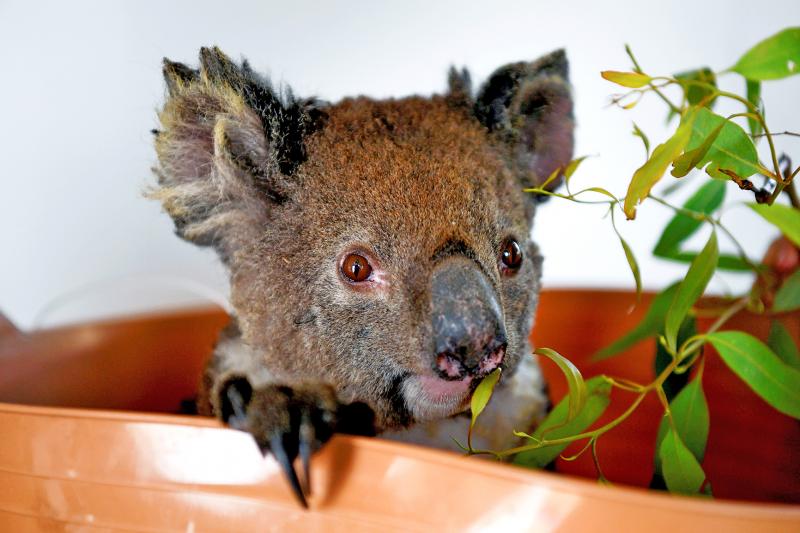Australia has lost about 30 percent of its koalas over the past three years, hit by drought, bushfires and developers cutting down trees, the Australian Koala Foundation said, urging the government to do more to protect the creature’s habitat.
The independent non-profit group estimated that the koala population has dropped to less than 58,000 this year from more than 80,000 in 2018, with the worst decline in the state of New South Wales, where the numbers have dropped by 41 percent.
“The declines are quite dramatic,” Australian Koala Foundation chairwoman Deborah Tabart said yesterday.

Photo: Reuters
There were no upward trends anywhere in Australia. Only one area in the study was estimated to have more than 5,000 koalas, and some regions were estimated to have as few as five or 10.
Tabart said that the country needs a koala protection law.
The Australian government in June called for public comment on a national recovery plan for New South Wales, Queensland and the Australian Capital Territory, as well as whether the koala’s threatened species protection status should be raised from “vulnerable” to “endangered.”
Comments on the recovery plan are due on Friday.
Besides the drought and fires, land clearing by property developers and road builders has destroyed the marsupial’s habitat.
“I think everyone gets it. We’ve got to change. But if those bulldozers keep working, then I really fear for the koalas,” Tabart said.

ELECTION DISTRACTION? When attention shifted away from the fight against the militants to politics, losses and setbacks in the battlefield increased, an analyst said Recent clashes in Somalia’s semi-autonomous Jubaland region are alarming experts, exposing cracks in the country’s federal system and creating an opening for militant group al-Shabaab to gain ground. Following years of conflict, Somalia is a loose federation of five semi-autonomous member states — Puntland, Jubaland, Galmudug, Hirshabelle and South West — that maintain often fractious relations with the central government in the capital, Mogadishu. However, ahead of elections next year, Somalia has sought to assert control over its member states, which security analysts said has created gaps for al-Shabaab infiltration. Last week, two Somalian soldiers were killed in clashes between pro-government forces and

Ten cheetah cubs held in captivity since birth and destined for international wildlife trade markets have been rescued in Somaliland, a breakaway region of Somalia. They were all in stable condition despite all of them having been undernourished and limping due to being tied in captivity for months, said Laurie Marker, founder of the Cheetah Conservation Fund, which is caring for the cubs. One eight-month-old cub was unable to walk after been tied up for six months, while a five-month-old was “very malnourished [a bag of bones], with sores all over her body and full of botfly maggots which are under the

BRUSHED OFF: An ambassador to Australia previously said that Beijing does not see a reason to apologize for its naval exercises and military maneuvers in international areas China set off alarm bells in New Zealand when it dispatched powerful warships on unprecedented missions in the South Pacific without explanation, military documents showed. Beijing has spent years expanding its reach in the southern Pacific Ocean, courting island nations with new hospitals, freshly paved roads and generous offers of climate aid. However, these diplomatic efforts have increasingly been accompanied by more overt displays of military power. Three Chinese warships sailed the Tasman Sea between Australia and New Zealand in February, the first time such a task group had been sighted in those waters. “We have never seen vessels with this capability

‘NO INTEGRITY’: The chief judge expressed concern over how the sentence would be perceived given that military detention is believed to be easier than civilian prison A military court yesterday sentenced a New Zealand soldier to two years’ detention for attempting to spy for a foreign power. The soldier, whose name has been suppressed, admitted to attempted espionage, accessing a computer system for a dishonest purpose and knowingly possessing an objectionable publication. He was ordered into military detention at Burnham Military Camp near Christchurch and would be dismissed from the New Zealand Defence Force at the end of his sentence. His admission and its acceptance by the court marked the first spying conviction in New Zealand’s history. The soldier would be paid at half his previous rate until his dismissal